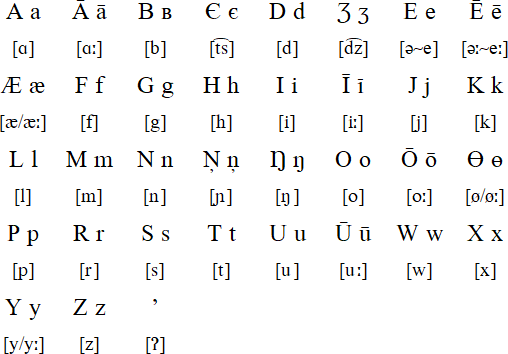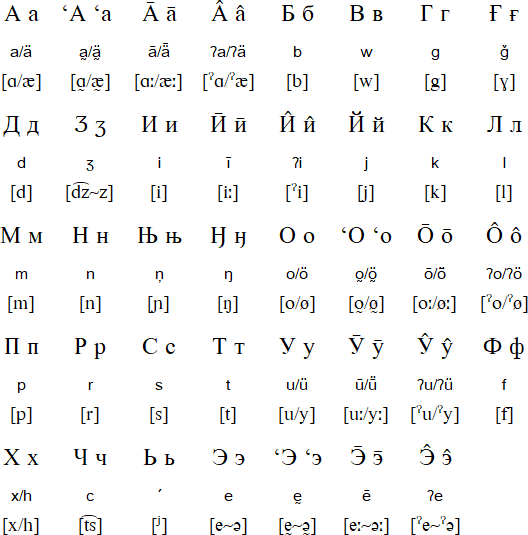Udege is a Tungusic language spoken in Primorsky Krai and Khabarovsk Krai in the Far Eastern Federal District of Russia, mainly on the Khor and Bikin rivers. In 2010 there were 1,493 Udege people, and 103 of them spoke Udege. Udege is also known as Udihe, Udekhe or Udeghe. It is closely related to Oroch and Nanai, and has borrowed many words from Nanai.
Udege was first written in the 1920s with a version of the Latin alphabet devised by Evgenij Scheider. He published a number of school books, translations from Russian, collections of Udege stories, and a dictionary. In 1938 the Cyrillic alphabet was adopted for Udege. Since then a number of Cyrillic orthographies have been created.


Download an alphabet chart for Udege (Excel)
Details of the Udege alphabets provided by Michael Peter Füstumum
Minti buadifi kuti wac’a biə, ņamahi buadu-tənə əgdi. Kuti nāŋgi dīŋkini bihini. Iŋaktani soligiʒi, p’aligiʒi kədəņəņə ōi. Utəmi mōkt’oi, ōkt’oi donini utawa əuji isə.
There are few tigers in our forests, but in warm countries there are many of them. The tiger is similar in size to the Manchu bear. Its coat has orange and black stripes. Hence it cannot be seen in the grass and bushes.
Source: https://books.google.co.uk/books
Information about Udege | Numbers
Information about Udege
https://en.wikipedia.org/wiki/Udege_language
https://ru.wikipedia.org/wiki/Удэгейский_язык
http://www.endangeredlanguages.com/lang/3021
http://www.ethnologue.com/18/language/ude/
https://books.google.co.uk/books
http://larkpie.net/siberianlanguages/udihe
Even, Evenki, Jurchen, Kili, Manchu, Nanai, Negidal, Oroch, Orok / Uilta, Oroqen, Udege Ulch, Xibe
Abaza, Abkhaz, Adyghe, Aghul, Akhvakh, Akkala Sámi, Aleut, Altay, Alyutor, Andi, Archi, Assyrian / Neo-Assyrian, Avar, Azeri, Bagvalal, Balkar, Bashkir, Belarusian, Bezhta, Bosnian, Botlikh, Budukh, Bulgarian, Buryat, Chamalal, Chechen, Chelkan, Chukchi, Chulym, Chuvash, Crimean Tatar, Dargwa, Daur, Dolgan, Dungan, Enets, Erzya, Even, Evenki, Gagauz, Godoberi, Hinukh, Hunzib, Ingush, Interslavic, Itelmen, Juhuri, Kabardian, Kaitag, Kalderash Romani, Kalmyk, Karaim, Karakalpak, Karata, Karelian, Kazakh, Ket, Khakas, Khanty, Khinalug, Khorasani Turkic, Khwarshi, Kildin Sámi, Kili, Komi, Koryak, Krymchak, Kryts, Kubachi, Kumandy, Kumyk, Kurdish, Kyrgyz, Lak, Lezgi, Lingua Franca Nova, Lithuanian, Ludic, Macedonian, Mansi, Mari, Moksha, Moldovan, Mongolian, Montenegrin, Nanai, Negidal, Nenets, Nganasan, Nivkh, Nogai, Old Church Slavonic, Oroch, Orok, Ossetian, Pontic Greek, Romanian, Rushani, Russian, Rusyn, Rutul, Selkup, Serbian, Shor, Shughni, Siberian Tatar, Sirenik, Slovio, Soyot, Tabassaran, Tajik, Talysh, Tat, Tatar, Teleut, Ter Sámi, Tindi, Tofa, Tsakhur, Tsez, Turkmen, Tuvan, Ubykh, Udege, Udi, Udmurt, Ukrainian, Ulch, Urum, Uyghur, Uzbek, Veps, Votic, Wakhi, West Polesian, Xibe, Yaghnobi, Yakut, Yazghulami, Yukaghir (Northern / Tundra), Yukaghir (Southern / Kolyma), Yupik (Central Siberian)
Languages written with the Latin alphabet
Page last modified: 23.12.23
[top]
You can support this site by Buying Me A Coffee, and if you like what you see on this page, you can use the buttons below to share it with people you know.

If you like this site and find it useful, you can support it by making a donation via PayPal or Patreon, or by contributing in other ways. Omniglot is how I make my living.
Note: all links on this site to Amazon.com, Amazon.co.uk
and Amazon.fr
are affiliate links. This means I earn a commission if you click on any of them and buy something. So by clicking on these links you can help to support this site.
[top]